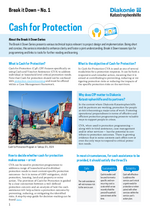Conflicts, extreme weather events, economic shocks and epidemics directly threaten people's livelihoods, food security and self-reliance. When asked what they need most urgently after a disaster, people commonly say they need financial resources to improve their situation on their own terms. Wherever markets are functional, it is Cash and Voucher Assistance (CVA) which allows responding to highly individual and pressing needs and which enables people to build or rebuild their livelihoods in the long term. Experts now consider the use of CVA and the market-based approach in humanitarian response as standard practice.
Inherent characteristics of Cash and Voucher Assistance
- can be used quickly and effectively, particularly through electronic transfers, which can reach large numbers of beneficiaries efficiently – this was demonstrated by its use in responses to the COVID-19 pandemic;
- provides flexibility to adapt to unique situations and respond to diverse and changing needs – whether those are in food, shelter, healthcare, protection, education, or other essential goods and services.
- enables short-term, immediate relief in the aftermath of an emergency, disaster, or conflict while also facilitating the development of long-term, sustainable livelihoods to enhance resilience.
- is a market-based approach which, if accompanied by a thorough assessment and monitoring, strengthens and supports local economies, stimulates demand for goods and services and promotes market growth;
- serves as a catalyst for enhancing the overall quality of humanitarian response, whether in the realm of digitalisation or localisation.
Diakonie Katastrophenhilfe's approach
Before, during and after an emergency or disaster, Diakonie Katastrophenhilfe and its partners support people affected by crises by upholding their dignity and prioritising their choice and flexibility. Responding to people's preferences that are by nature cross-sectoral, Diakonie Katastrophenhilfe and its partners are systematically including CVA in the response analysis and currently around 25% of all of our projects use CVA as a modality. Building up people's livelihoods and strengthening their resilience in a self-determined way underpins Diakonie Katastrophenhilfe’s localised way of working. (Group)Cash transfers allow affected populations to recover their means of subsistence through the purchase of essential assets for their livelihoods, access to services and/or debt repayment. They also allow new, more productive and/or resilient livelihoods to be established. The market-based approach is therefore included as a priority and strategic goal within the Diakonie Katastrophenhilfe Strategy 2021+.
From local markets to sustainable livelihoods
Diakonie Katastrophenhilfe and its partners recognise the transformative potential of linking emergency relief to the long-term stabilisation of sustainable livelihoods, ultimately bridging the humanitarian-development-peace nexus. Together with our sister organisation, Brot für die Welt, we actively advocate for exploring linkages between CVA and government-led adaptive social protection systems. By using CVA in disaster risk reduction (DRR), we provide a flexible and effective tool to support preparedness, response and recovery efforts, while putting affected communities at the center of decision-making.
As a member of the ACT Alliance, Diakonie Katastrophenhilfe is a signatory to the Grand Bargain Commitments and participates in various inter-agency forums and working groups, including the KoA Working Group on Cash, led by the German Federal Foreign Office and the CALP Cash and Locally-Led Response Working Group, shaping the discussion on a more localised and people-centred approach to the market-based response.
Your contact for further questions

Luise Kluge
Humanitarian Adviser for Food Security & Livelihoods
luisemarie.kluge@diakonie-katastrophenhilfe.de

